联系我们
与泰克代表实时聊天。 工作时间:上午 9:00 - 下午 5:00(太平洋标准时间)。
致电我们
工作时间:上午9:00-下午5:00(太平洋标准时间)
下载
下载手册、产品技术资料、软件等:
反馈
USB 2.0 Electrical Compliance Testing Software for 5/6 Series MSO
Option 5-CMUSB2/6-CMUSB2 Datasheet

USB 2.0 is a widely used system bus, due to its reliability and cost-effectiveness. The bus uses differential signaling and its bit rate ranges from 1.5 Mb/s (low speed) to 480 Mb/s (high speed). To ensure that USB 2.0 implementations are robust and interoperable, the standard defines a series of tests, including mask testing and parametric testing of low-speed, full-speed, and high-speed for devices, hosts, and hubs. This datasheet describes TekExpress USB2 Electrical Compliance testing software (option 5-CMUSB2/6-CMUSB2) for the 5/6 Series MSO, which automates the standard tests.
Even without the USB2 Electrical Testing Software option, the 5/6 Series MSO offers a versatile range of signal analysis tools for design validation and debug.
It is recommended to perform an in house compliance testing of the measurements using the USB2.0 Electrical Compliance testing software (5/6-CMUSB2) to identify and address the potential USB 2.0 design issues and then send the product for a formal certification. This reduces the product failure risk at the USB workshop or at the test house. This can save time, reduce the expenses and also identify specification conditions.
The USB Implementers Forum, Inc. (USB-IF) defines a suite of tests that determine compliance with the USB 2.0 standard. The goal of the testing is to confirm a design’s reliability and compatibility. Designers must pass all compliance tests recommended by the USB-IF to use the USB-IF logo on their packaging. However, many designers also use the tests to perform validation and margin testing, thereby increasing confidence in their designs.
Manually performing the standard tests is difficult and requires significant expertise, but the 5/6 Series MSO, equipped with Option 5-CMUSB2/6-CMUSB2, facilitates testing by handling oscilloscope setup, automating tests, evaluating pass/fail results, and report generation. The option is built on the proven TekExpress® automated serial compliance testing platform.
Design validation and debug
Testing the design can easily be accomplished early in the design process and ahead of final certification testing by using the 5/6 Series MSO oscilloscope. The oscilloscope’s standard measurement set, along with the optional 5-DJA/6-DJA Advanced Jitter and Timing Analysis software supports several of the key compliance tests including:
- Eye diagram analysis of USB signals
- Full characterization of jitter performance including TIE and histogram profiles
- Rise and fall time analysis
Eye pattern analysis is a proven technique to evaluate long data streams of complex communication signals. Eye pattern display is standard in the 5/6 Series MSO, but Advanced Jitter and Eye Analysis software (option 5-DJA/6-DJA) provides 31 additional measurements and jitter decomposition algorithms to help get to root cause.
Tektronix also offers an optional 5-SRUSB2 and 6-SRUSB2 decode and trigger solution to perform USB specific protocol level analysis on the design.
Using the signal analysis and protocol decoder increases the likelihood of passing compliance tests, and can provide broader insight beyond the standard compliance tests.
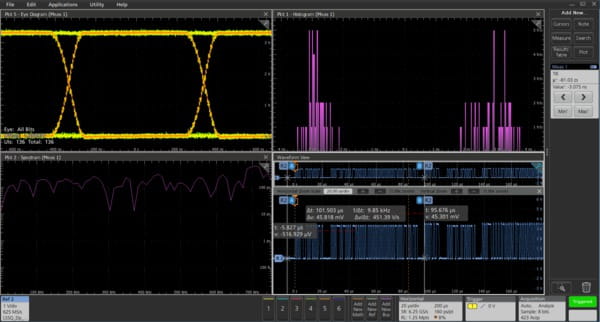
Automated USB 2.0 testing with option 5-CMUSB2/6-CMUSB2
USB 2.0 electrical testing requires an oscilloscope with minimum bandwidth of 2 GHz. TekExpress USB2 software for the 5/6 Series MSO (5-CMUSB2/6-CMUSB2) provides automated compliance testing for USB 2.0 serial bus verification, including:
- High-speed tests: Signal Quality, Receiver Sensitivity, Chirp, Reset, Reset from High Speed, Reset from Suspend, Resume, and Suspend
- Eye diagram, Jitter, Rise time, Fall time, and EOP width
- Packet Parameter and Monotonicity
- Power measurements: Droop and Inrush current
TekExpress USB2 supports Device, Host, and Hub test suites and each suite includes approximately 50 measurements. Executing all the measurements manually is extremely time-consuming. TekExpress USB2 software has an automation framework built around these measurements, so that you can execute all the measurements with fewer clicks and intervene only to change connections.
TekExpress USB2 software allows you to select complete or selective testing of any of the transmitter electrical specifications. Tests are configured by following a step-by-step process. The software sets up the oscilloscope and automates the testing, guiding you to accurate and repeatable results. It generates a comprehensive, date-stamped test report with pass/fail results, waveforms, and data plots.
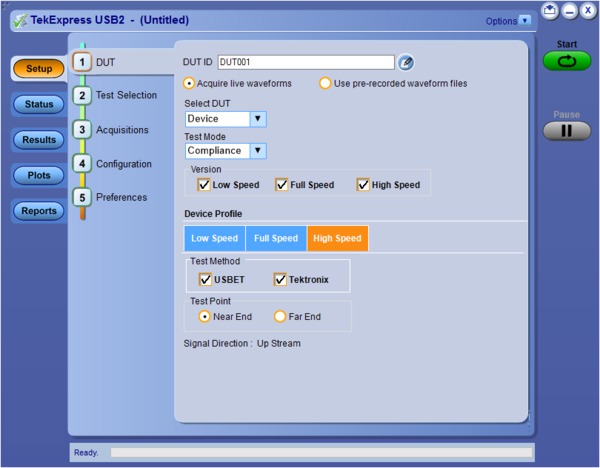
Software navigation follows a logical workflow for quick test setups, changes and review of test results. Valid testing requires proper cabling, probes, and connections between fixtures, instruments, and the device under test (DUT). The software provides setup instructions for each test, with images and reference illustrations showing correct configurations.
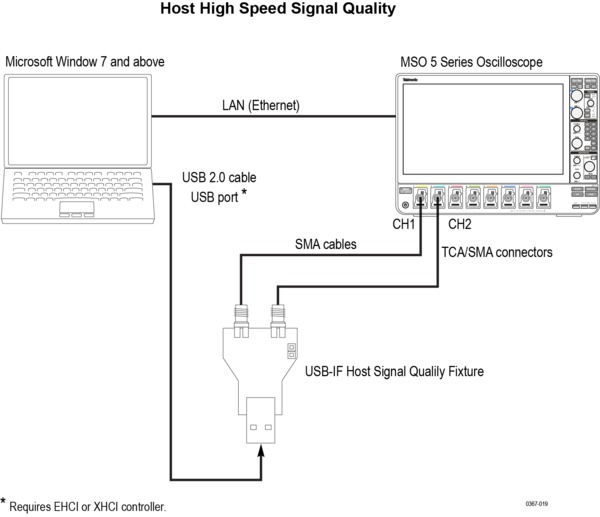
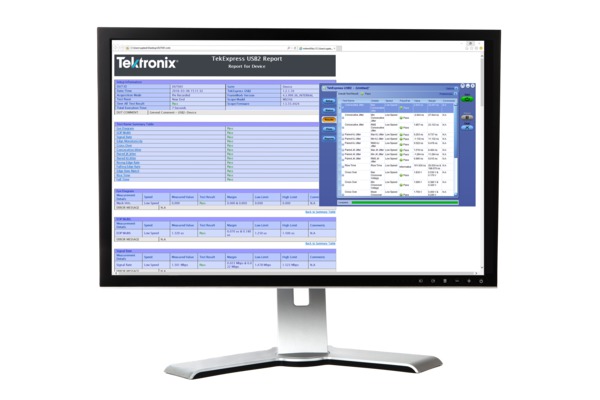
TekExpress USB2 software requires a Tektronix 5/6 Series MSO oscilloscope with Option 5-WIN/6-WIN or SUP5-WIN/SUP6-WIN (Microsoft Windows 10). This is a Windows application and the software displays TekExpress USB2 software and test reports on the oscilloscope display. However, for convenience an external monitor may be connected to the 5/6 Series MSO so test controls and reports can be viewed on the external display, while signal acquisition is observed on the primary oscilloscope display.
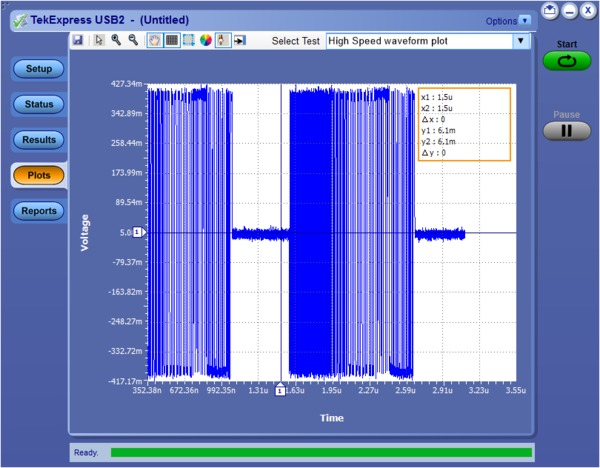
For each test, the DUT must be placed in specific operating modes using industry standard HS electrical test tool software (USBHSET.exe) from the USB Implementers Forum, Inc (USB-IF). The USBHSET tool runs on a Windows PC. The PC can be connected to the 5/6 Series MSO via LAN (Ethernet), allowing TekExpress USB2 to communicate with the USBHSET tool to automatically put the DUT in the correct mode for each test.
For each test or series of tests, you select the test of interest. The TekExpress software shows you how to configure the DUT with proper test fixtures, cables or probes. You initiate the test and the software performs all the necessary instrument setups and prompts you only when needed. Quick Pass/Fail tests substantiated with results makes USB 2.0 application the preferred solution for USB 2.0 physical-layer validation. The user-defined measurement limits and custom-mask testing also helps you to perform tolerance testing.
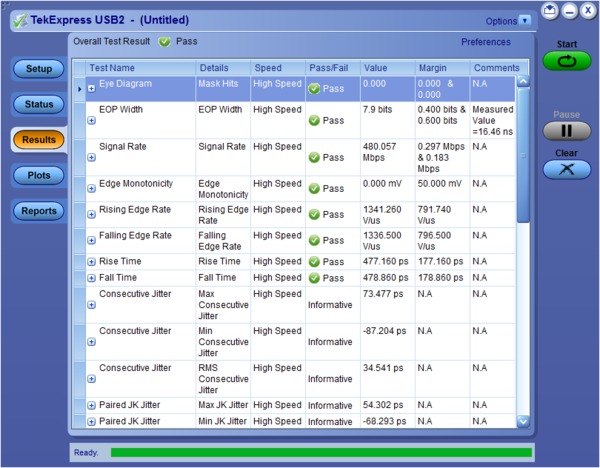
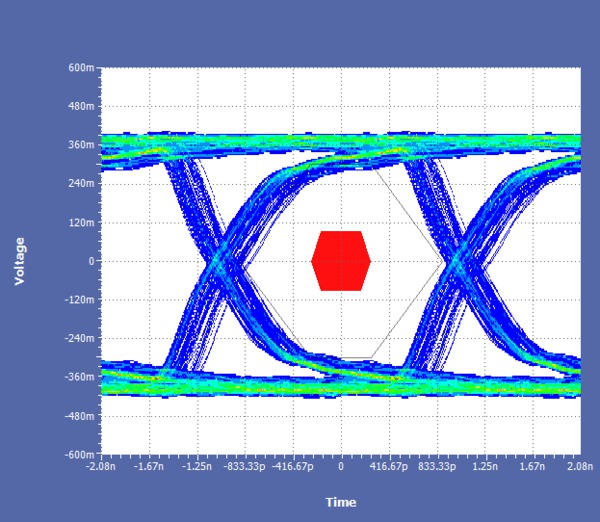
The TekExpress USB2 application has a dedicated Plots panel, which helps you to analyze eye diagrams and signal quality. The panel also allows you to place cursors, zoom into the plot and save the plot as an image. This allows you to perform eye diagram analysis with custom masks and evaluate device margins.
Pass/fail reports
Creating test documentation is quick and easy with summary reports available in MHTML, CSV, or PDF formats. The report is generated automatically when the test execution is complete and provides Pass/Fail status for measurements. The report also includes test configuration details, waveform plots, oscilloscope displays and margin analysis, to provide more insights into your design.
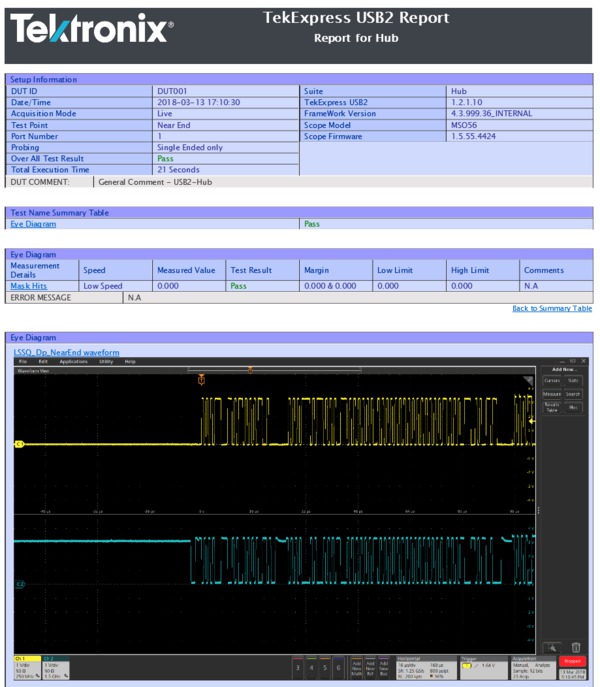
Probing and test fixtures
The following probes are recommended for USB 2.0 testing:
Differential probes: P6248, TDP1500, and TDP3500
Single-ended probes: P6245, TAP1500, and TAP2500
Current probe for Inrush current test: TCP0030A
Fixtures provide connection points for USB 2.0 electrical testing.
Refer to Ordering Information for recommended test fixtures.
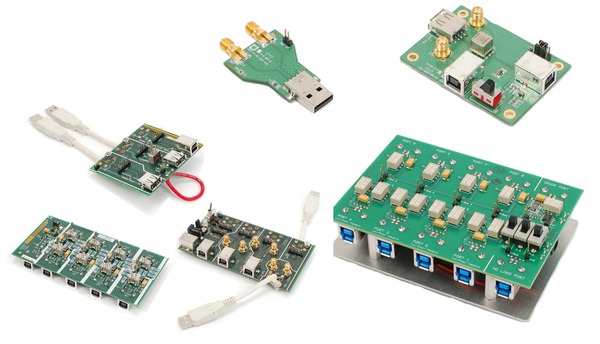
Specifications
- USB tests
- Host, Hub, and Device
- Signal Quality tests
- Eye Diagram Test, Jitter (JK, KJ, and Consecutive), Crossover Voltage Range, Signal Rate, End-of-Packet Width, Rising Edge Rate, and Falling Edge Rate
- High-speed tests
- Receiver Sensitivity, Chirp, Reset, Resume, Reset from High Speed, Reset from Suspend, Packet Parameter, and Edge Monotonicity
- Inrush Current check
- Data-sufficiency readout. Coulombs and Capacitance listed across inrush regions
- Droop test
- Volts readout
- Speed selection
- Low-speed (LS), Full-speed (FS), and High-speed (HS)
- Signal direction
- Upstream and Downstream
- Test Point selection
- Near End and Far End
- Report Generation format
- MHTML, PDF, and CSV formats
Ordering information
Product requirements, options and recommended accessories
- Required hardware
Oscilloscope 5/6 Series MSO oscilloscope with minimum bandwidth of 350 MHz (option 5-BW-350/6-BW-1000 or higher) for Low-speed and Full-speed USB. 5/6 Series MSO oscilloscope with minimum bandwidth of 2 GHz (option 5-BW-2000/6-BW-2500 or higher) for Low-speed, Full-speed, and High-speed USB. Supported instruments MSO54, MSO56, MSO58, MSO64, MSO66, MSO68 Option 5-WIN or SUP5-WIN (removable SSD with Microsoft Windows 10 operating system). 6-WIN or SUP6-WIN (removable SSD with Microsoft Windows 10 operating system). - Required software
Application Option License Type TekExpress USB 2.0 electrical testing software. 6-CMUSB2 New instrument license 5-CMUSB2 New instrument license SUP6-CMUSB2 Upgrade license SUP5-CMUSB2 Upgrade license SUP6-CMUSB2-FL Floating license SUP5-CMUSB2-FL Floating license - Recommended options
Option Application 6-DJA or SUP6-DJA Advanced Jitter and Eye Analysis measurements 5-DJA or SUP5-DJA Advanced Jitter and Eye Analysis measurements 6-SRUSB2 or SUP6-SRUSB2 Automated Trigger and Decode for USB 2.0 5-SRUSB2 or SUP5-SRUSB2 Automated Trigger and Decode for USB 2.0 - Probing
- Recommended
Probes Quantity TDP1500 or TDP3500 Differential probe 1 TAP1500 or TAP2500 Single-ended probe 3 TCP0030A Current probe 1
- Supported
Probes Quantity P6248 1 P6245 3
- Signal sources
- Recommended
- Tektronix AWG5200 signal source.
- Supported
- Tektronix AWG5000C, AWG7000C, AWG70000A signal source.
- Recommended test fixtures
Test Fixtures Vendor USB 2.0 Std-A/Std-B Electrical Test Fixture Any USB-IF approved Test Fixture.
Please visit www.usb.org for fixture details.USB 2.0 Type-CTM Electrical Test Fixture Any USB-IF approved Test Fixture.
Please visit www.usb.org for fixture details.- Recommended cables
- SMA to SMA Cable Pair (174-5771-xx).
- Recommended extras
- External PC monitor, USB keyboard, and USB mouse.
Additional information
Tektronix offers a range of solutions for USB testing, including HSIC (High Speed Inter Connect) and USB 3.0. To see a comprehensive listing, and download the latest resources, visit www.tek.com/usb.
For all probing related information, visit www.tek.com/probe-selector.
For exploring other supported application and capabilities of latest Tektronix 5 series MSO oscilloscope, visit www.tek.com/oscilloscope/5-series-mso-mixed-signal-oscilloscope.
For USB 2.0 standards documents and test procedures, as well as USBHSET software and test fixtures, please visit www.usb.org/home.


